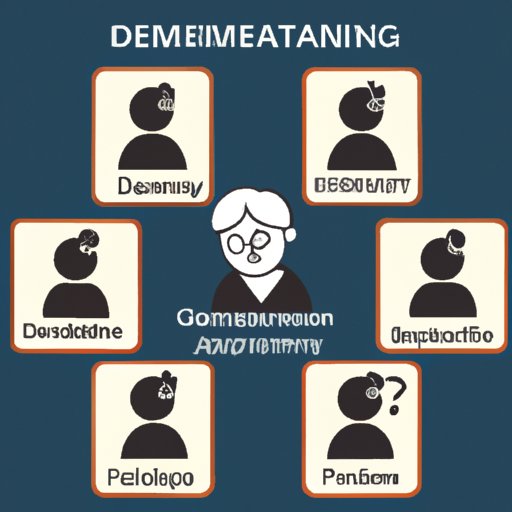
Introduction
Dementia is a term used to describe a range of symptoms related to a decline in memory, language, thinking, and problem-solving abilities. It is important to recognize these symptoms early on in order to manage the condition effectively. In this article, we will explore common signs of dementia, how to identify symptoms in yourself or a loved one, and the importance of recognizing early warning signs.
10 Common Signs of Dementia You Should Look Out For
The following are 10 common signs of dementia:
- Memory Loss: Forgetting recently learned information or important dates.
- Difficulty with Language: Struggling to find the right words or understanding what others are saying.
- Poor Judgement: Difficulty making decisions or solving problems.
- Misplacing Items: Putting things in unusual places and being unable to remember where they are.
- Withdrawal from Work or Social Activities: Losing interest in hobbies or avoiding social situations.
- Changes in Mood and Personality: Becoming anxious, suspicious, or easily upset.
- Difficulty with Basic Tasks: Struggling to perform familiar tasks such as getting dressed or cooking a meal.
- Confusion with Time and Place: Getting lost in familiar places or being unable to tell time or date.
- Misinterpreting Visual Information: Difficulty in interpreting colors, judging distances, and illusions.
- Impaired Spatial Reasoning: Struggling with activities that involve coordination or spatial awareness, such as driving.
Each of these signs is an indication of a decline in cognitive abilities and may be a warning sign of dementia. They can manifest in daily life in various ways. For instance, memory loss may lead to forgetting appointments, while difficulty with language may affect the ability to hold a conversation.
Unpacking the Symptoms of Dementia: What to Expect
Dementia symptoms can be categorized into three types: physical, cognitive, and emotional.
Physical Symptoms: People with dementia may experience physical symptoms such as motor problems, difficulty with movement, or loss of balance. They may also experience fatigue, changes in appetite, or sleep disturbances.
Cognitive Symptoms: Cognitive symptoms of dementia include memory impairment, language difficulties, impaired judgement, and disorientation. These symptoms can make it challenging for individuals to perform daily tasks, such as using a phone or toileting.
Emotional Symptoms: Emotional symptoms of dementia can be characterized by irritability, anxiety, or depression. These symptoms can be difficult to manage and may require pharmacological or non-pharmacological interventions.
The progression of symptoms over time can vary from person to person. However, it is important to recognize the early signs of dementia in order to manage the condition and provide support as needed.
Recognizing the Red Flags: Understanding Dementia Symptoms
Early recognition of dementia symptoms is essential for effective management. While some signs of dementia are well-known, there are others that are not as widely recognized.
Changes in Personality: Dementia can lead to changes in personality, including becoming more withdrawn or irritable. These changes can be accompanied by a lack of interest in activities that were once enjoyed.
It is important to respond to suspected symptoms of dementia proactively. This may include seeking a diagnosis from a healthcare professional or encouraging the person to attend medical appointments. Non-pharmacological interventions such as cognitive stimulation therapy may also be helpful in managing symptoms.
How to Identify Dementia Symptoms in Yourself or a Loved One
Recognizing symptoms of dementia can be challenging, particularly in oneself. It is important to monitor one’s own cognitive abilities regularly and seek help if necessary. The following tips may be helpful:
- Keep a Journal: Writing down incidents when memory or language difficulties arise can help track changes over time.
- Use Memory Aids: Using tools such as reminders, alarms, or confirmations can help with daily tasks.
- Take Regular Breaks: Overworking the brain can lead to fatigue and reduced cognitive functioning. Taking regular breaks can help with cognitive fatigue.
If a loved one is suspected of having dementia, it is important to approach the issue with empathy and understanding. Encouraging them to seek a diagnosis can help in the management of symptoms.
Breaking Down the Early Warning Signs of Dementia
Recognizing early warning signs of dementia is crucial in the effective management of the condition. The following are some early warning signs to look out for:
- Mild Cognitive Impairment: This can include forgetfulness or difficulty with language.
- Changes in Sense of Humor: Dementia can affect a person’s sense of humor, leading to inappropriate or insensitive humor.
- Difficulty with Navigation: Getting lost in familiar environments or struggling with direction may indicate early signs of dementia.
It is important to seek medical help early on and work with healthcare professionals to manage symptoms and provide support.
Conclusion
In conclusion, recognizing symptoms of dementia is important in the effective management of the condition. The signs of dementia can manifest in various ways, including physical, cognitive, and emotional symptoms. It is important to recognize early warning signs to seek medical help as early as possible. Non-pharmacological interventions such as cognitive stimulation can be helpful in managing symptoms. With early recognition and support, those living with dementia can live fulfilling and meaningful lives.





